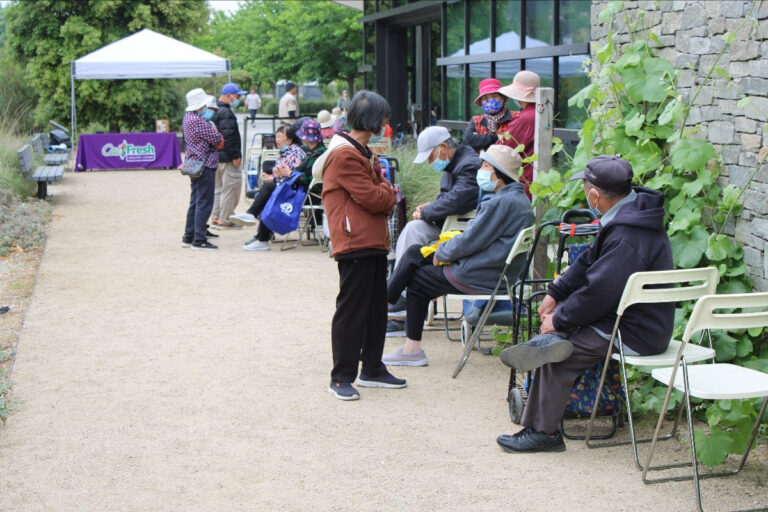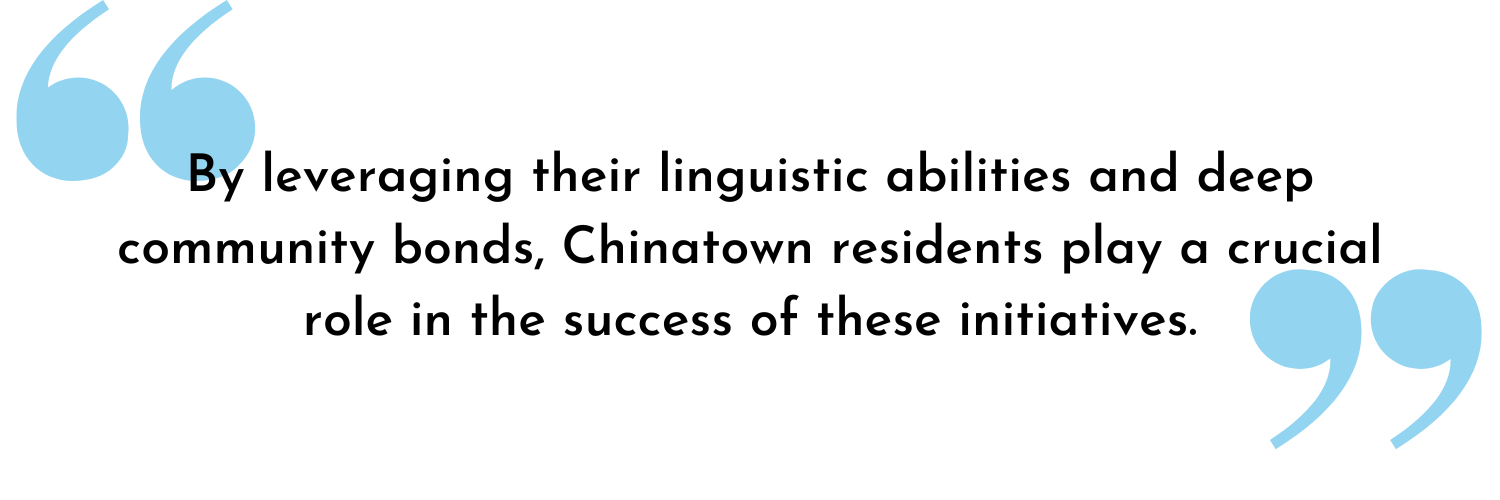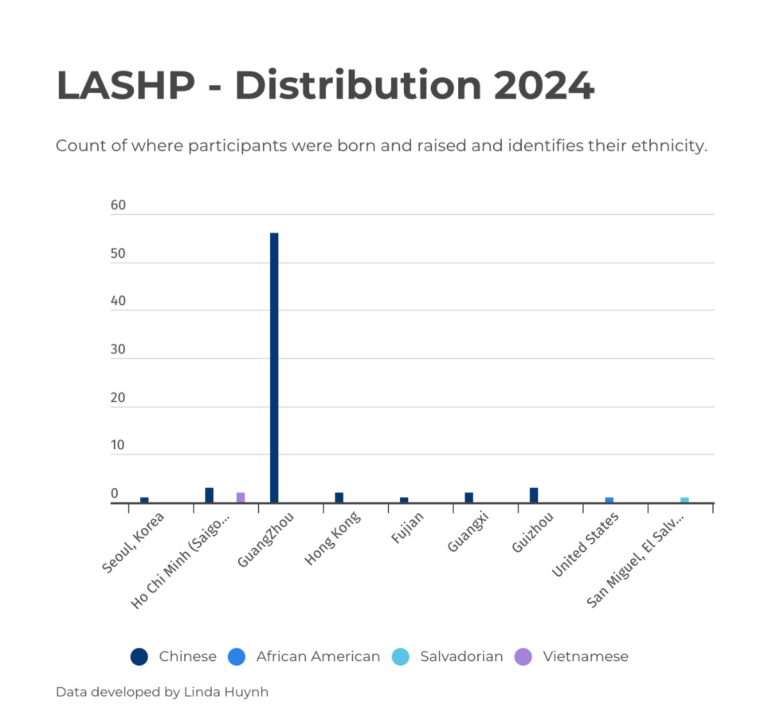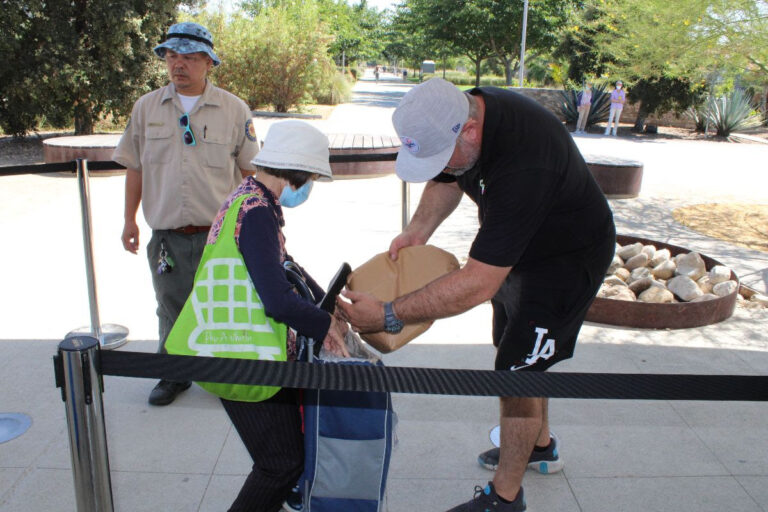
Author: Linda Huynh
Editors: Vanessa Hoos, Chantal Lauren Rose
By sharing their cultural insights, multilingual skills, and strong community bonds, Chinatown’s older adult residents have played a crucial role in the success of monthly food distribution events facilitated by local partners and organizations like APIFM, CalFresh, Los Angeles State Historic Park (LASHP), and Active San Gabriel Valley (SGV).
In the mornings, Chinatown’s residential elders are particularly active, often grocery shopping at local stores like MW Mart and BH Mart. On days when shopping isn’t necessary, they self-organize for Tai Chi sessions or set up tables to play mahjong at Alpine Recreational Park. For larger gatherings, LASHP becomes a venue for aerobic dancing, with YouTube videos set up on smartphones placed on trees or building shelves.
Evenings in Chinatown showcase working residents picking up groceries from local corner stores or grabbing affordable to-go meals from CBS Seafood on Spring and Ord. These daily activities highlight the unique residential, business, and amenity traits that are integral to the identity of Los Angeles Chinatown.

Despite their resourcefulness, Chinatown’s older adults face significant economic and social challenges due to xenophobia and colonization, limiting their access to fresh, affordable food. Health conditions, mobility issues, lack of transportation, language barriers, and culturally inappropriate foods further exacerbate food insecurity for this population. Language barriers, in particular, hinder older adults from connecting with nutrition support programs, with over half (57%) of Chinatown residents speaking a language other than English and almost a third (70%) having little to no English proficiency.
To mitigate these challenges, APIFM is dedicated to providing appropriate accommodations to reduce language and mobility barriers for Chinatown residents attending local food events. Since 2017, APIFM has developed meaningful relationships with these older adults through health-positive programs and friendly conversations throughout each class. APIFM also hosts monthly free healthy food distribution events in partnership with CalFresh Healthy Living (CFHL), catering to the community’s need for culturally diverse foods and helping alleviate food costs, allowing residents to prioritize monthly rent payments.

For instance, a resident who speaks both Cantonese and Vietnamese can translate nutrition education materials and instructions, ensuring that Vietnamese-only speakers can fully participate. Because of this, the food distributions incorporate various cultural languages represented in the community, including Toisan, Cantonese, Mandarin, Spanish, Vietnamese, and English, and are conveniently located within walking distance of the neighborhood.

Chinatown residents have cultivated a tight-knit community where they advocate for each other, particularly for those with limited mobility. Resident volunteers often deliver extra produce bags to homebound older adults, demonstrating a strong sense of care and solidarity. Additionally, their effective word-of-mouth outreach promotes LASHP’s healthy food events among neighbors and friends, ensuring broad community participation.
Chinatown community members have been instrumental in shaping the distribution program at LASHP, offering diverse cultural insights and addressing language needs. With the help of CFHL funding, APIFM hired two community members fluent in Cantonese and Mandarin. However, when staff cannot meet other language needs, such as Vietnamese and Toisan, community members volunteer to interpret and relay information.
These events have also fostered a space for socializing and connecting, where community members with limited literacy in their native language receive help from others who can read Chinese or other languages. To accommodate limited literacy, APIFM has adapted materials to visually communicate key information, such as a monthly calendar that clarifies event dates.

LASHP has been another critical partner, ensuring safe and accessible produce distribution events. For over three years, APIFM and LASHP have collaborated to distribute fresh produce and ensure the comfort of older adults by providing shaded seating areas. Community members appreciate the park staff’s efforts in providing comfortable seating, something not offered at other food pantries. LASHP also helps with setup, cleanup, crowd control, and translation services.
Another valuable partner is Active SGV, an agency under the CalFresh Healthy Living program. For the past two years, they have offered free beginner-friendly yoga and nutrition education classes before the events. Together, these collaborations create a holistic approach to community wellness.
The success of these food distribution events is largely due to the care and engagement of the older adult Chinatown residents themselves. Resident involvement includes providing cultural translations, feedback on produce provided, and contributions of culturally relevant educational materials. For instance, many community members arrive early, often before APIFM staff, and self-organize to designate someone to write sequential numbers on everyone’s hands. This practice helps maintain order, prevent queue cutting, and ensure fair access to the provided produce.



